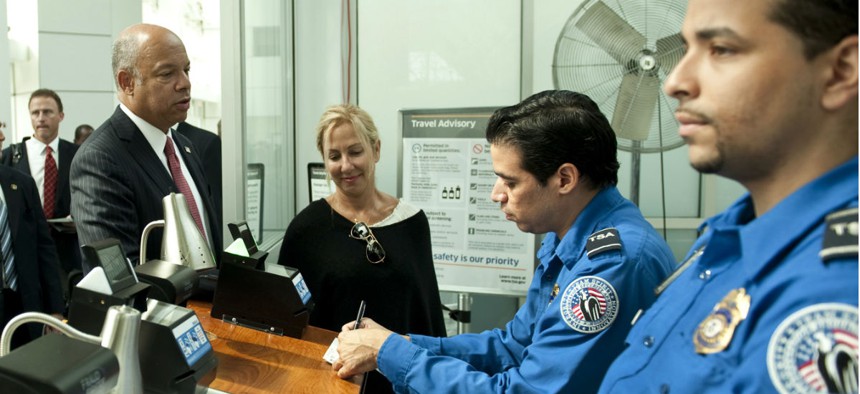
DHS Secretary Jeh Johnson and his wife, Dr. Susan DiMarco, pass through TSA security at John F. Kennedy International Airport in September 2014. DHS photo by Barry Bahler
Lawmakers Push for Bargaining Rights for TSA Employees
Powerful committee Democrats say TSA workers are entitled to the same rights as other unionized feds.
Lawmakers on Tuesday introduced legislation that would expand the collective bargaining rights of Transportation Security Administration employees, allowing TSA workers to negotiate over the same issues that most unionized feds already do.
The 2016 Rights for Transportation Security Officers Act, introduced by House Homeland Security Committee Ranking Member Bennie Thompson, D-Miss., and House Appropriations Committee Ranking Member Nita Lowey, D-N.Y., would bring 40,000 transportation security officer employees in line with all Title 5 federal workers. The officers -- which make up 70 percent of TSA’s workforce and are represented by the American Federation of Government Employees -- won union representation in 2011, but do not currently enjoy the same bargaining rights as do other federal employees with labor backing.
The bill would strip TSA of its ability to establish a personnel management system, instead handing off that responsibility to its parent agency, the Homeland Security Department. The new system would be “mindful of tenure and status, particularly with respect to leave, pay, group life, health insurance, and severance pay,” the bill’s authors said.
The measure also would allow security officers to appeal adverse personnel decisions to the Merit Systems Protection Board, a right they currently do not possess.
“Unfortunately, TSA’s personnel system to attract, retain, and develop a strong workforce has fallen short,” Thompson said. “Implementing basic worker protections for this critical workforce has been a lengthy fight and it is time for Congress to come together and enact legislation that will grant these frontline security workers the rights and benefits that they deserve.”
Morale at TSA has for years floundered in the basement of federal rankings; in 2015, the Partnership for Public Service designated the agency as the 313th best place to work out of a total of 320.
Lowey said TSOs -- “who are trying to pay mortgages and rent, send their kids to college and save for retirement” -- deserve the same “basic rights” afforded to most other federal employees.
The bill would “provide equal footing, improve morale and ensure stability for the screening workforce,” she said. “It’s long past time to extend the protection of the federal civil service system to our valuable TSOs.”
AFGE has maintained a stressed relationship with TSA management in the five years since it began representing the agency’s employees. In a meeting with reporters earlier this week, the group’s National President J. David Cox said the agency has abused its unilateral power to control negotiations, pointing to a recent decision to remove parking from the bargaining table. TSA’s unionized employees in December narrowly avoided facing an extended period without a collective bargaining agreement in place, with the agency and AFGE agreeing at the 11th hour to a majority of provisions of a new contract. The remaining issues will be settled in arbitration.
AFGE TSA Council President Hydrick Thomas threw his support behind the new legislation, saying it would bring about fairness.
“We work very hard under some of the most stressful and dangerous conditions, but are treated like second-class employees as compared to the rest of the federal workforce,” he said. “We just want equal treatment.”







